
Personal Growth Books
These ten books represent the most influential and transformative works in personal development literature, each having shaped millions of lives over decades. From classics written in the 1930s to modern breakthroughs in psychology and neuroscience, they form a comprehensive library for personal transformation.
We believe true growth requires exploring different dimensions of human potential—from mindset and habits to relationships, resilience, and healing. While these books naturally share some common themes, each brings a unique perspective and approach that has proven transformative for countless readers.
Together, they offer a complete foundation for anyone committed to personal development, addressing both the practical and profound aspects of becoming who you're meant to be.
The 10 All-Time Favorite Books for Personal Growth
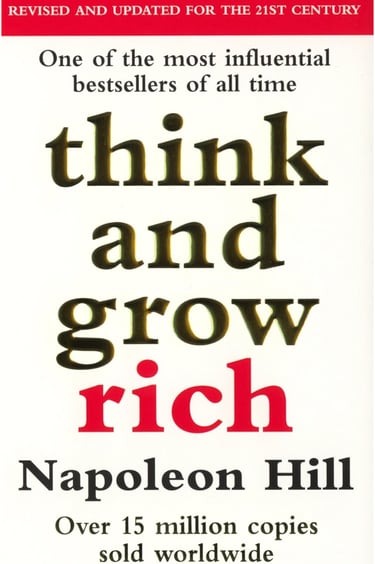

Why you should read it
This book provides a systematic approach to goal achievement through mental conditioning and practical planning. You'll find frameworks for developing self-discipline, building strategic partnerships, and maintaining focus through setbacks. Hill's research offers insights into how successful people think differently about failure, decision-making, and opportunity. It's particularly useful for understanding the psychological foundations that many modern success methodologies build upon.
What we think about this book
Napoleon Hill's work has significantly influenced the personal development field, and many of his concepts remain relevant. The 13 principles provide a structured approach to achievement that goes beyond simple positive thinking. Some aspects reflect the era it was written in, and the examples are heavily focused on financial success in industrial America. Readers often find value in the chapters on organized planning and the mastermind principle, though the metaphysical elements may not resonate with everyone. It's worth reading as a foundational text to understand where many contemporary success concepts originated.
What the book is about
Written during the Great Depression, this book examines the common patterns found among successful individuals. Napoleon Hill spent two decades interviewing over 500 wealthy Americans, including Andrew Carnegie and Henry Ford, to identify 13 principles they shared. The core premise is that success begins with a clear definition of what you want, followed by organized planning and persistent action, regardless of the field you're pursuing.
Think and Grow Rich - Napoleon Hill
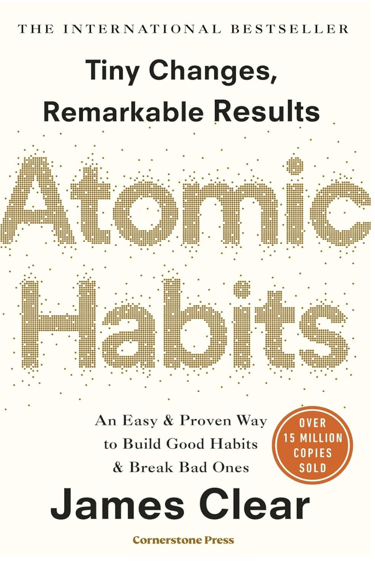

Why you should read it
Clear provides a practical 4-step framework (cue, craving, response, reward) that explains the mechanics of habit formation at a neurological level. You'll learn specific strategies for making good habits obvious and attractive while making bad habits invisible and unattractive. The book connects habit change to identity change, showing how sustainable transformation happens when you focus on who you want to become rather than what you want to achieve. It's particularly useful for anyone who has struggled with willpower-based approaches to change.
What we think about this book
James Clear's approach stands out for its emphasis on systems over goals and its grounding in behavioral psychology research. The book's strength lies in its actionable strategies - like habit stacking and environment design - that you can implement immediately. The writing is clear and examples are relatable, making complex behavioral science accessible. Some readers might find the concepts familiar if they're well-versed in habit literature, but Clear's synthesis and practical application make it one of the most comprehensive guides on the subject. The focus on small changes makes the process feel manageable rather than overwhelming.
What the book is about
This book examines how small, consistent changes in behavior compound over time to create significant results. James Clear presents a framework for understanding why habits form, how they work, and most importantly, how to change them. The core argument is that you don't need dramatic transformations - instead, getting 1% better each day through tiny adjustments to your systems and environment will lead to remarkable outcomes over months and years.
Atomic Habits - James Clear


Why you should read it
The book offers an introduction to visualization techniques and positive thinking practices that many people find helpful for clarifying goals and maintaining optimism. You'll learn about the role of gratitude in shifting perspective and various techniques for reframing negative thought patterns. Byrne presents testimonials and interpretations from multiple teachers, giving readers exposure to different approaches to manifestation and mindset work. It's accessible to those new to personal development concepts and requires no prior knowledge of metaphysical ideas.
What we think about this book
The Secret popularized the Law of Attraction for a mainstream audience and has influenced how many people think about goal-setting and positive thinking. The emphasis on gratitude and visualization can be valuable tools for mental well-being and motivation. However, the book lacks scientific evidence for its central claims and oversimplifies complex life circumstances by suggesting that thoughts alone determine outcomes. Critics rightfully point out that it minimizes systemic issues and can lead to victim-blaming. While some readers find the practices helpful for maintaining a positive mindset, it's best approached as one perspective on personal development rather than a complete solution to life's challenges.
What the book is about
This book presents the concept of the "Law of Attraction" - the idea that thoughts have a magnetic frequency that attracts corresponding experiences into your life. Rhonda Byrne compiles teachings from various self-help authors and spiritual teachers who claim that by focusing on what you want rather than what you don't want, you can manifest your desires into reality. The book covers how to apply this principle to health, wealth, relationships, and personal happiness.
The Secret - Rhonda Byrne
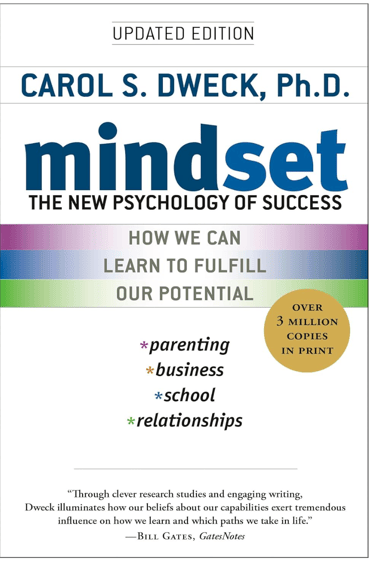

Why you should read it
Dweck provides extensive research demonstrating how mindset influences learning, resilience, and achievement across different domains. You'll understand why praising effort rather than intelligence leads to better outcomes in children, how companies with growth mindsets outperform their competitors, and why some people thrive on challenges while others avoid them. The book offers practical strategies for recognizing fixed mindset triggers and developing a growth mindset in yourself and others. It's particularly valuable for parents, educators, managers, and anyone interested in understanding human potential and performance.
What we think about this book
Carol Dweck's research has significantly influenced education and organizational development, and the evidence base is substantial. The distinction between fixed and growth mindsets provides a useful framework for understanding behavior patterns and resistance to change. The book includes compelling case studies from schools, sports, and business that illustrate the concepts clearly. Some applications of the theory have been oversimplified in popular culture, and having a growth mindset alone doesn't guarantee success without appropriate resources and support. The book is most valuable when read as research-based insight into motivation and learning rather than a quick fix for achievement.
What the book is about
Stanford psychologist Carol Dweck presents decades of research on how our beliefs about ability and intelligence fundamentally shape our achievements. The book introduces two mindsets: fixed (believing talents and abilities are static traits) and growth (believing abilities can be developed through effort and learning). Dweck demonstrates how these mindsets affect performance in education, business, sports, and relationships, showing that the view we adopt for ourselves profoundly affects the way we lead our lives.
Mindset: the new psychology of success
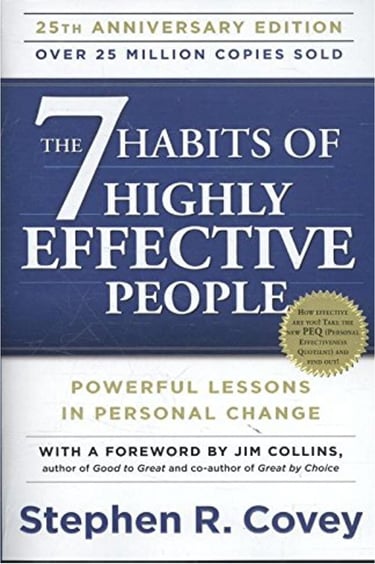

Why you should read it
This book provides a comprehensive framework for personal effectiveness that goes beyond simple time management or success tips. You'll learn how to take responsibility for your choices, create a personal mission statement that guides your decisions, and build meaningful relationships based on mutual benefit. Covey introduces powerful concepts like the emotional bank account, the abundance mentality, and the difference between urgent and important tasks. The book is particularly valuable for anyone seeking to align their daily actions with their deepest values and long-term goals.
What we think about this book
Stephen Covey's work has fundamentally shaped the personal development field, and the seven habits remain remarkably relevant decades after publication. The book's strength lies in its focus on timeless principles rather than techniques, making it applicable across cultures and generations. The paradigm shifts Covey describes - particularly moving from dependence to independence to interdependence - offer profound insights into human development. Some readers may find the corporate examples dated, but the underlying principles are universal. The habits require genuine commitment to implement, but those who do often report transformative results in both their personal and professional lives.
What the book is about
Published in 1989, this book presents a principle-centered approach for solving personal and professional problems. Stephen Covey argues that true success comes from aligning ourselves with universal principles of effectiveness rather than quick-fix personality techniques. The book outlines seven sequential habits that build upon each other, moving from personal independence (habits 1-3) to interdependence (habits 4-6), culminating in continuous renewal (habit 7). Covey emphasizes that lasting change happens from the inside out, starting with character and principles rather than behaviors and attitudes.
The 7 Habits of Highly Effective People - Stephen R. Covey
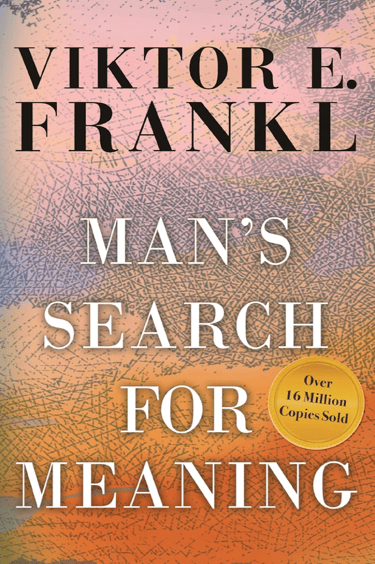

Why you should read it
This book offers profound insights into finding purpose even in the darkest circumstances. You'll learn Frankl's three sources of meaning: creating work or doing deeds, experiencing values (truth, beauty, love), and choosing one's attitude toward unavoidable suffering. The book demonstrates that between stimulus and response lies our freedom to choose, and this choice determines our growth and freedom. It's essential reading for anyone facing adversity, questioning life's purpose, or seeking to understand human resilience. Frankl's blend of personal testimony and psychological insight makes complex philosophical concepts accessible and deeply moving.
What we think about this book
Viktor Frankl's masterpiece stands as one of the most influential books of the 20th century, and rightfully so. The combination of Holocaust testimony and psychological theory creates a uniquely powerful reading experience that has helped millions find meaning in their struggles. Frankl's central message - that we can't always control what happens to us, but we can control how we respond - offers hope without minimizing genuine suffering. While some critics argue the book oversimplifies complex trauma, most readers find Frankl's insights transformative. The book's brevity and clarity make it accessible, while its depth rewards multiple readings. It's particularly powerful for those grappling with loss, illness, or existential questions.
What the book is about
Written by Holocaust survivor and psychiatrist Viktor Frankl, this book combines a harrowing memoir of life in Nazi concentration camps with an introduction to logotherapy, Frankl's psychotherapeutic method. The first half details Frankl's experiences in Auschwitz and other camps from 1942-1945, observing how prisoners responded to extreme suffering. The second half explains his theory that the primary human drive is not pleasure (Freud) or power (Adler), but the search for meaning. Frankl argues that we cannot avoid suffering, but we can choose how to cope with it, find meaning in it, and move forward with renewed purpose.
Man's Search for Meaning - Viktor E. Frankl
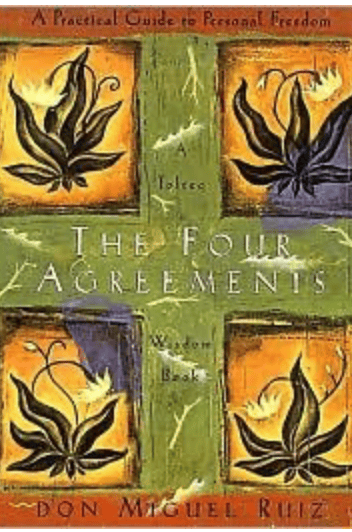

Why you should read it
The book offers a deceptively simple code of conduct that can rapidly transform your experience of life. You'll understand how most of our suffering comes from the agreements we've unconsciously made about ourselves and the world. The four agreements provide practical tools for personal freedom - from the power of speaking with integrity to the liberation of not taking others' actions personally. Each agreement builds on the others to create a new framework for living with authenticity and joy. It's particularly helpful for those struggling with self-judgment, difficult relationships, or feeling trapped by others' opinions.
What we think about this book
Don Miguel Ruiz has distilled complex spiritual concepts into four memorable principles that are easy to understand but profound in their application. The book's greatest strength is its simplicity - the agreements are straightforward enough to remember in daily life yet deep enough to contemplate for years. While some may find the spiritual framework too New Age or the promises of transformation overly optimistic, millions have found genuine liberation through practicing these principles. The book works best when approached with openness rather than skepticism. The agreements aren't quick fixes but require conscious practice, though even imperfect application often yields noticeable improvements in peace of mind and relationships.
What the book is about
Based on ancient Toltec wisdom, this book presents four simple yet profound agreements you can make with yourself to create love and happiness in your life. Ruiz explains how we have been domesticated from childhood by a system of rewards and punishments that creates limiting beliefs and self-judgment. The four agreements are: Be Impeccable with Your Word, Don't Take Anything Personally, Don't Make Assumptions, and Always Do Your Best. By adopting these agreements, Ruiz argues we can break free from self-limiting beliefs that create needless suffering and rediscover our authentic selves.
The Four Agreements - Don Miguel Ruiz
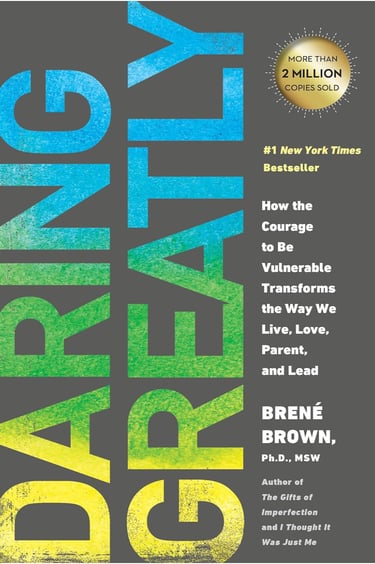

Why you should read it
This book will fundamentally change how you think about vulnerability, courage, and worthiness. You'll learn to recognize shame triggers and develop resilience strategies, understand the difference between guilt and shame, and discover how perfectionism actually prevents us from being seen. Brown provides practical tools for showing up authentically in your life, even when there are no guarantees. The book is especially valuable for leaders, parents, and anyone struggling with perfectionism or fear of judgment. Her research-based approach combined with relatable storytelling makes complex emotional concepts accessible and actionable.
What we think about this book
Brené Brown has created a cultural phenomenon by giving us language and tools for navigating vulnerability and shame - topics most of us avoid discussing. Her research is rigorous, but her writing remains warm and conversational, making you feel like you're talking with a wise friend. The book's strength lies in normalizing universal struggles while providing concrete strategies for growth. Some readers might find the emphasis on vulnerability uncomfortable or the examples too focused on middle-class American experiences. However, most find Brown's insights revolutionary for understanding themselves and improving relationships. The concept of "daring greatly" has resonated particularly strongly in leadership and parenting contexts.
What the book is about
Based on over a decade of research, Brené Brown explores how vulnerability is not weakness but rather our clearest path to courage, engagement, and meaningful connection. The title comes from Theodore Roosevelt's "Man in the Arena" speech about daring greatly even when we risk failure and criticism. Brown examines how our culture's myths about vulnerability keep us disconnected and afraid, then offers strategies for embracing vulnerability in parenting, work, and relationships. She introduces concepts like shame resilience, wholehearted living, and the importance of boundaries in cultivating authentic connections.
Daring Greatly - Brené Brown
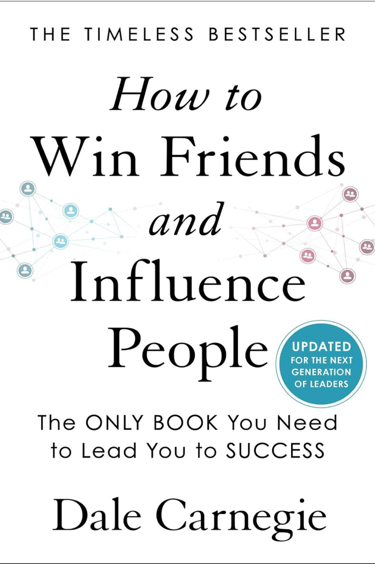

Why you should read it
Despite being nearly 90 years old, Carnegie's principles remain remarkably effective for building relationships and succeeding in any field involving human interaction. You'll learn timeless techniques like remembering people's names, becoming genuinely interested in others, and admitting mistakes quickly and emphatically. The book provides practical strategies for handling complaints, giving feedback, and inspiring others to improve. It's essential reading for anyone in leadership, sales, customer service, or simply wanting to improve their personal relationships. Carnegie's emphasis on empathy and authentic appreciation offers a refreshing alternative to manipulative influence tactics.
What we think about this book
Dale Carnegie created the template for all future relationship and influence books, and his principles have stood the test of time remarkably well. The book's enduring success stems from its focus on genuine human connection rather than manipulation - Carnegie emphasizes that these techniques only work when applied sincerely. While some examples feel dated and the style can be repetitive, the core principles remain powerful. Critics argue it can encourage people-pleasing or superficial relationships, but when applied authentically, Carnegie's methods build genuine rapport and mutual respect. Warren Buffett credits this book with transforming his life, and millions of others have similar stories.
What the book is about
First published in 1936 during the Great Depression, this groundbreaking book teaches fundamental techniques in handling people, ways to make people like you, how to win people to your way of thinking, and how to change people without arousing resentment. Carnegie based his advice on years of teaching public speaking and human relations courses, filled with anecdotes from historical figures and successful businesspeople. The core principle is that success comes from genuine interest in others, understanding their perspectives, and making them feel important and appreciated.
How to Win Friends and Influence People - Dale Carnegie
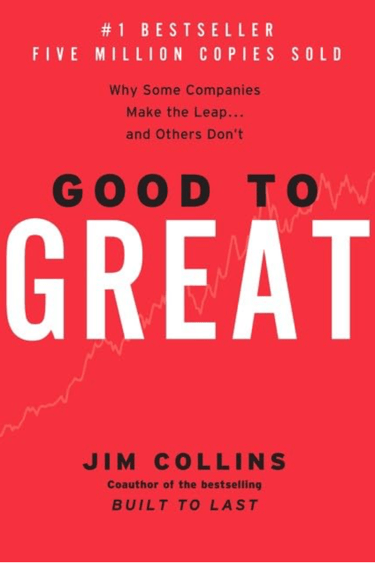

Why you should read it
While written for businesses, the principles apply powerfully to personal development and any organizational endeavor. You'll learn why "good is the enemy of great" and how most people and organizations settle for competence rather than excellence. The book provides frameworks for identifying your unique strengths, building momentum through consistent action, and achieving breakthrough results. Collins' research methodology ensures these aren't just opinions but patterns validated across multiple successful organizations. It's particularly valuable for leaders, entrepreneurs, and anyone seeking to understand what separates exceptional performance from mediocrity.
What we think about this book
Jim Collins has created one of the most influential business books ever written, but its insights extend far beyond corporate strategy. The research is thorough and the conclusions often counterintuitive - like how the most successful leaders are often quiet and humble rather than charismatic. The Hedgehog Concept alone is worth the price of admission, helping readers find the intersection of what they're passionate about, what they can be best at, and what drives their economic engine. Some critics note that several "great" companies later faltered, but the principles remain valid even if execution is challenging. The book is most powerful when readers apply its concepts to their own lives and work rather than viewing it purely as business theory.
What the book is about
Through rigorous research spanning five years, Jim Collins and his team identified companies that made the leap from good to great and sustained those results for at least fifteen years. They discovered that great companies share specific characteristics: Level 5 Leadership (combining personal humility with professional will), getting the right people on the bus before figuring out where to drive it, confronting brutal facts while maintaining faith, the Hedgehog Concept (focusing on what you can be best at), a culture of discipline, and using technology as an accelerator rather than a creator of momentum. The book reveals how building something great is a cumulative process, like pushing a giant flywheel.
Good to Great - Jim Collins
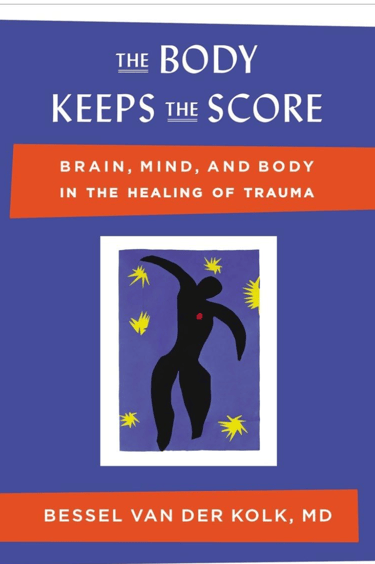

Why you should read it
This book revolutionizes our understanding of trauma and its treatment, showing that traditional talk therapy alone is often insufficient for healing trauma. You'll learn how trauma affects the brain and body, why traumatized people often can't "just get over it," and how body-based approaches can succeed where conventional methods fail. The book provides hope for anyone dealing with trauma, whether from childhood abuse, accidents, war, or other overwhelming experiences. It's essential reading for therapists, educators, parents, and anyone seeking to understand how adverse experiences shape us and how we can heal. Van der Kolk makes complex neuroscience accessible while maintaining scientific rigor.
What we think about this book
This groundbreaking work has transformed how we understand and treat trauma, influencing fields from psychiatry to education. Van der Kolk's integration of neuroscience, attachment theory, and body-based therapies offers a comprehensive view of trauma rarely found in a single volume. The book's strength lies in its balance of scientific evidence, clinical wisdom, and genuine compassion for survivors. Some readers may find the clinical details disturbing or the scientific sections dense, but van der Kolk writes with remarkable clarity about complex topics. The emphasis on body-based healing methods has been particularly influential, validating approaches once considered alternative. While not a self-help book per se, many readers report profound insights about their own experiences and healing journeys.
What the book is about
Dr. Bessel van der Kolk, one of the world's foremost experts on trauma, presents decades of research showing how trauma literally reshapes both body and brain, compromising sufferers' capacities for pleasure, engagement, self-control, and trust. The book explains how trauma is not just "all in your head" but leaves a physical imprint on the body. Van der Kolk explores innovative treatments—from neurofeedback and meditation to sports, drama, and yoga—that offer new paths to recovery by activating the brain's natural neuroplasticity. He demonstrates how relationships and community are fundamental to healing and how trauma can be transformed through embodied experiences.
